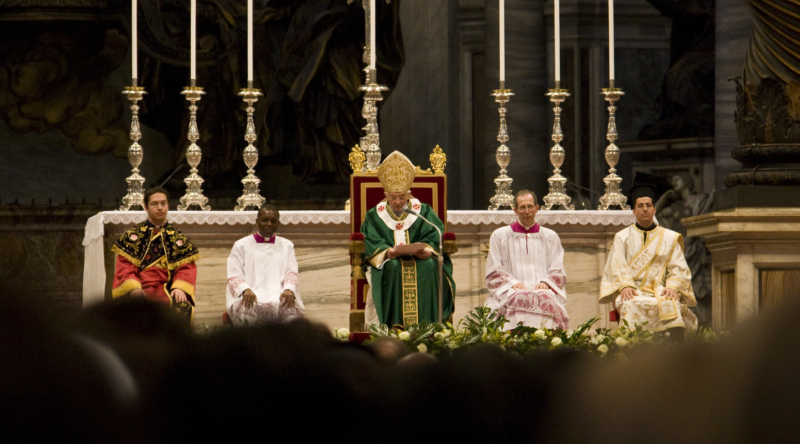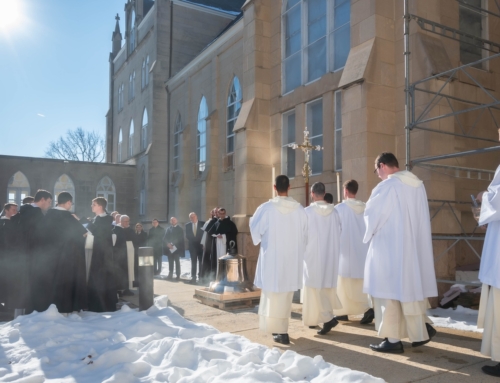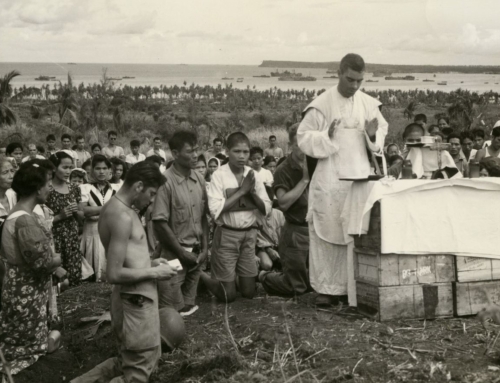In 1989, Cardinal Ratzinger concluded his remarks at the quadricentennial celebration of a German seminary by recalling how in his youth there was still a notion among some rural people that studying to be a priest was simply a matter of learning to say Mass. Those people, he said, consequently wondered why it took so long for a man to become a priest, even if he did have to learn Latin. Such a portrait of priestly formation is, of course, a comical oversimplification. As those of us taking final exams this week can attest, preparation for holy orders comprises far more than mere liturgical training. Nevertheless, Ratzinger draws out a profound truth from their seemingly naïve thinking:
Rightly understood, we could indeed say that in the final analysis the preparation for the priesthood is a question of learning how to celebrate the Eucharist. But we could also turn this around and say: the Eucharist is there to teach us life. The school of the Eucharist is the school of right living, it makes us apprentices of the One who alone was entitled to say of himself: “I am the way, and the truth, and the life.”
The Eucharist teaches us life. We could spend many hours of prayer contemplating this insight and pondering the ways that the Mass—not just the readings or the homily but the whole familiar and mysterious rite—teaches us how to live and how to follow Christ.
Think, for example, of the pattern of giving and receiving that occurs. We bring God an offering of bread and wine. We call them the gifts. Who is giving to whom, though? The truth is that we have nothing of our own—absolutely nothing we could give to God that is not already his gift to us. Thus, God gives first—initiating even our very desire to worship him—and we, in turn, offer back to the Lord from what he has given to us. How does God then respond? He graciously accepts our modest, unremarkable gifts of bread and wine, and in his unfathomable generosity, by the words of the priest, transubstantiates them. Bread and wine no longer remain, but now in their place we receive the saving Body and Blood of Jesus. God returns to us what we have returned to him, except now radically different, infinitely greater.
By our participation in this sacred ritual, we learn a pattern: God gives; we return his gifts; he elevates them and then returns them to us. What happens with the bread and wine at Mass can happen in an analogous way with the totality of our lives. God wants us to bring everything to him—our families, friendships, careers, aspirations, disappointments, victories, lapses, consolations, crosses, and everything else. When we consciously hand all these things over to him, he accepts them and blesses them with his presence—invariably. This is one among many lessons that one learns best from the school of the Eucharist.
In 2016, at a celebration of his 65th anniversary of priestly ordination, Pope Emeritus Benedict XVI showed himself still a devoted student of that school in his brief closing remarks, which he delivered without any notes:
Sixty-five years ago, a fellow priest who was ordained on the same day wrote on the memorial card for his first Mass his name, the date, and a single word in Greek: Eucharistomen, Eucharistomen. This word, in all its dimensions, expresses all that can be said at this moment. . . . [Christ] has transformed into thanksgiving and so into blessing, the Cross, the suffering, all the evil of the world. And thus He has fundamentally transubstantiated life and the world, and has given us, and gives us today the Bread of true life, which overcomes the world thanks to the strength of his love.
Every man studying to be a priest must eventually learn to say Mass. Every Christian who wants to discern God’s marvelous ways and live a life informed by such wisdom must become a student of the Mass. Benedict XVI shows us that this is a lifelong project.
✠
Photo by Fr. Lawrence Lew, O.P. (used with permission)







